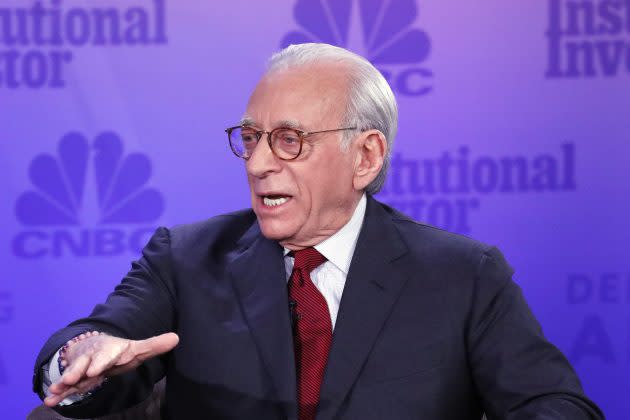Nelson Peltz Officially Launches Disney Proxy Fight, Aiming to Push Company to Hit ‘Netflix-Like’ Streaming Margins. But Can He Get the Votes to Win?

As promised, Trian Partners, the hedge fund led by activist investor Nelson Peltz, officially submitted its preliminary proxy statement for the election of Peltz and former Disney CFO Jay Rasulo to Disney’s board at the Mouse House’s 2024 annual shareholders meeting.
In its filing Thursday, Trian also outlined its goals and initial perspectives for Disney regarding corporate governance, streaming profitability — to “target and achieve Netflix-like margins” of 15%-20% by fiscal year 2027 — as well as ESPN, studio creativity, and growth in Disney’s Parks and Experiences unit. It’s all intended, according to the company, to “#RestoreTheMagic” at the media conglomerate.
More from Variety
Disneyland Workers Seeking to Form Union for 1,700 Character Performers With Actors' Equity
Taylor Swift Sells 'Eras Tour' Concert Film Rights to Disney+ for More Than $75 Million (Report)
'Moana 2' Was Supposed to Be a Disney+ Series. Why It's Hitting Movie Theaters Instead
But the key question is: Can Nelson Peltz get the backing of enough Disney shareholders to succeed in shaking up the board and challenging CEO Bob Iger for the future direction of the company?
Trian’s proposals, including its two board nominees, would require an affirmative vote of the holders of a majority of shares of the Walt Disney Co. to pass. To date, Trian has not disclosed whether it has the support of any of Disney’s other shareholders.
Looking at the results of Disney’s 2023 shareholder vote, there was overwhelming support for the Disney-recommended slate of 11 directors and other board-backed proposals. Per the vote tally from the meeting held April 3, 2023, each of the candidates received at least 93% of shares voted (excluding abstentions and broker non-votes). The board candidacy of Iger, for one, got 96.7% of shares cast in favor. So as of last year, there was no significant shareholder agitation for change.
But last year, those board members won uncontested elections. Peltz, of course, still has several months to try to win over votes before the 2024 Disney shareholders meeting sometime this spring (the date is TBA).
In a statement, Peltz said, “It is unfortunate that a company as iconic as Disney and with so many challenges and opportunities has refused to seriously engage with us, its largest active shareowner, about board representation. Instead of having a boardroom that would include directors with an ‘ownership mentality’ that can bring fresh perspectives to the company’s challenges, Disney is resisting change and asking shareholders to endorse a board comprised mainly of legacy directors (and their hand-picked successors) who have repeatedly failed to properly plan for CEO succession, misaligned the incentives of management, and failed to oversee or drive a strategy to get the streaming business to profitability or the studios to produce good content.”
Peltz asked rhetorically: “Are Disney shareholders really to believe the current board is able to heal these self-inflicted wounds?” Trian also announced the launch of its website, RestoreTheMagic.com, where it has laid out its case for shaking up the Disney board.
Disney, in its own proxy filing Jan. 16, formally rejected Trian’s nominations of Peltz and Rasulo). In addition the board recommended that shareholders not vote for three candidates (Craig Hatkoff, Jessica Schell and Leah Solivan) floated by Blackwells Capital. Instead, Disney urged shareholders to vote for its own 12-memeber slate of board candidates, including recent additions Morgan Stanley CEO James Gorman and former Sky chief Jeremy Darroch.
Earlier this month, Disney announced it had lined up the backing of activist investor ValueAct Capital, which has a “significant” ownership position in the media conglomerate, Bloomberg has reported, but the actual size is not known. Trian controls about $3 billion worth of Disney’s shares, 78% of which are owned by former Marvel Entertainment chairman Ike Perlmutter (whom Disney alleges has a “longstanding personal agenda” against Iger).
Trian, in waging its proxy fight, argues that Disney has underperformed the larger market and its media and tech industry peers as the result “of a board that has failed to adequately perform its primary responsibilities as stewards of shareholder capital.”
“A major problem at Disney, in Trian’s view, is that the goals have been amorphous and the execution poor,” the hedge fund said in its SEC filing. Trian outlined five areas of concern at Disney — and its proposals to address them:
Corporate Governance: Adopt best-in-class governance; finally complete a successful CEO succession; and align management pay with performance
Streaming Profitability: Target and achieve Netflix-like EBITDA margins of 15-20% by FY 2027
Future of ESPN: Commit to a reasonable, defined payback period and return profile on ESPN flagship direct-to-consumer and communicate it in detail prior to launch
Studio Creativity: Board-led review of creative processes and structure to restore leadership accountability and reclaim No. 1 box office position with leading economics
Parks and Experiences Growth: Execute on a clear vision for Parks targeting at least high-single digit operating income growth to ensure adequate returns on ~$60 billion of capex
VIP+ Analysis: 4 Tips for Iger on Disney’s ‘Building’ Phase
Best of Variety
Sign up for Variety’s Newsletter. For the latest news, follow us on Facebook, Twitter, and Instagram.

